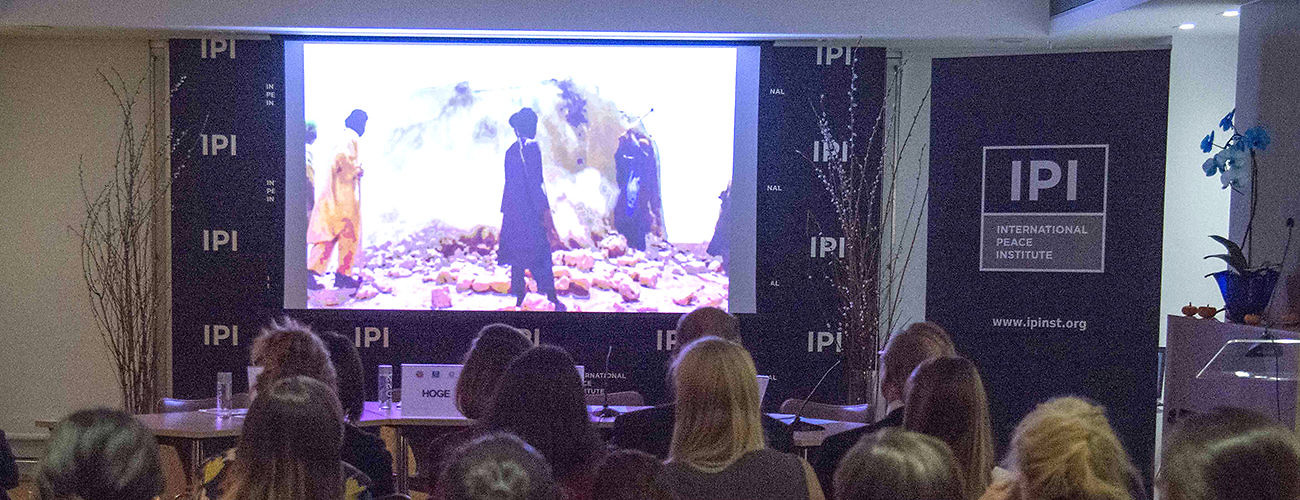On the evening of October 25th, IPI screened a new documentary film called The Destruction of Memory, which chronicles the willful acts of destruction and looting of symbols of past civilizations by ISIS fighters and efforts being made to bring such acts under the purview of international humanitarian and human rights law. Afterwards, an expert panel shared their reactions to the film and their thoughts on the protection of cultural heritage.
“It’s not collateral damage, it’s actually a weapon of war,” said Lise Gregoire, Deputy Permanent Representative of the Netherlands to the United Nations, in her opening remarks. “Destruction of cultural heritage strikes at the very foundation of a society, deliberately erasing common roots and destroying social fabric.”
Inigo Lambertini, Deputy Permanent Representative of Italy to the United Nations, echoed Ambassador Gregoire’s condemnation of the cultural destruction documented in the film. “What I have seen in Iraq is incredible,” he said. “The idea that someone could build political, religious, and criminal activity in destroying this important piece of our history struck me a lot.”
In a panel discussion following the film screening, Karima Bennoune, United Nations Special Rapporteur in the field of cultural rights, pointed out that prevention “should always be the priority” but “when destruction does occur, it is essential that there be accountability.”
The Destruction of Memory highlights the trial of Ahmad Al Faqi Al Mahdi at the International Criminal Court for intentional attacks against religious and historical buildings in Timbuktu, Mali in July of 2012, during an Islamist insurgency in the country’s northern region. He was found guilty on September 27, 2016 and was sentenced to nine years’ imprisonment. Ms. Bennoune referred to this case as an example of growing acknowledgement by the international community that destruction of cultural heritage amounts to a violation of humanitarian law. “I was very pleased to see that in that case, the court said the crime was one of ‘significant gravity,’ so really recognizing the seriousness of the harm.”
“If you talk to Malians,” she continued, “they were as upset about this as they were about the other atrocities that were going on. Understanding that connection between human rights, human beings, and heritage, is essential with going forward with the body of law that we’d all like to see.”
Bonnie Burnham, Senior Advisor at the World Monuments Fund, addressed the issue of how to weigh the destruction of objects against human life. “We in the heritage sector have always said that human life and the context of human life are inseparable, and you are depriving people of aspects of their life when you deprive them of the context that nurtures that.”
Burnham went on to commend France’s partnership with the United Arab Emirates in establishing a “decent-sized trust fund” that provides training for human rights officials to defend cultural heritage sites under threat. “The idea of stopping international traffic by enforcing it with laws, the idea of prosecution, all of that could flow out of this effort. It shows that the world is really waking up and realizing this is something.”
Tim Slade, the director and producer of the film, expressed hope that The Destruction of Memory will be a call to action for governments, translating condemnation of cultural destruction into enforcement and prevention by the international community.
“In an ironic way, the film comes at a good time, in terms of the fact that this issue is getting attention. Obviously it’s not good that the destruction is happening, but it’s a timely message” he said. “What’s good is that it’s being seen by different audiences, audiences such as the one here tonight, which includes representatives of governments. If there are to be legal frameworks, it has to start with the UN and states.”
The event was co-sponsored by the Permanent Missions of the Netherlands and Italy to the United Nations.
Warren Hoge, IPI Senior Advisor for External Relations, moderated the discussion.








